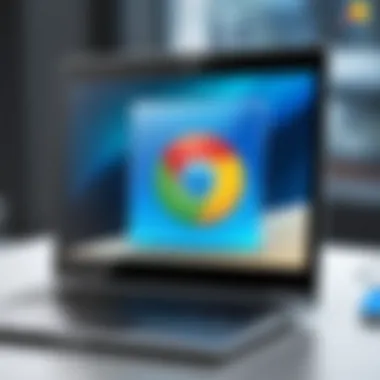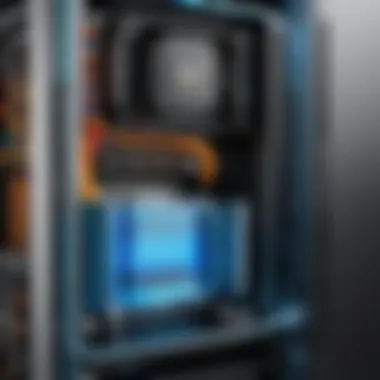Ultimate Guide to Updating Internet Explorer in Windows 7 for Seamless Browsing


Product Overview
Performance Comparison
Analyzing the performance of Internet Explorer in Windows 7 involves benchmark tests and comparisons with other web browsers. Speed and efficiency metrics are paramount in assessing the browser's responsiveness and usability. By evaluating how Internet Explorer stacks up against its competitors, users can make informed decisions on whether to update or switch to alternative browsers.
Features and Technology
Internet Explorer in Windows 7 boasts unique features and technological advancements that set it apart from earlier versions. Enhanced security protocols, support for modern web technologies, and compatibility with a wide range of websites ensure a seamless browsing experience. Moreover, its integration with Cortana, Microsoft's virtual assistant, enhances productivity and convenience for users.
Pros and Cons
Value for Money
Updating Internet Explorer in Windows
Introduction
Updating Internet Explorer on Windows 7 is a crucial task to ensure optimal browsing performance and security. In today's digital age, where cyber threats loom large, having an outdated browser can leave your system vulnerable to attacks. This article serves as a comprehensive guide to walk you through the process of updating Internet Explorer effectively, safeguarding your online activities and enhancing your browsing experience.


Significance of Browser Updates
Enhanced Security Features
Enhanced security features play a pivotal role in updating Internet Explorer on Windows 7. These features act as a robust defense mechanism against malicious software, phishing attacks, and other online threats. By incorporating advanced encryption protocols, real-time threat detection, and secure browsing settings, enhanced security features ensure that your online data remains protected and your privacy intact. The stringent security measures embedded within these updates make Internet Explorer a reliable choice for users aiming to fortify their digital presence. Despite its significance in enhancing online safety, users should remain vigilant about potential compatibility issues or performance impacts that may arise from intensive security protocols.
Improved Performance and Compatibility
Checking Current Internet Explorer Version
Checking the current version of Internet Explorer on your Windows 7 system is a crucial step in ensuring optimal browsing performance and security. By identifying the current version, you can determine if updates are required to enhance your browsing experience. This process allows you to stay informed about the latest features and security patches provided by newer versions of Internet Explorer. Understanding your current Internet Explorer version also helps in troubleshooting any compatibility issues with websites or applications that may arise due to outdated software.
Determining the Need for an Update
Considering Security Patches and Enhancements
Reviewing the Latest Updates
In the realm of cybersecurity, where vigilance is key to safeguarding sensitive data and privacy, reviewing the latest updates stands as a cornerstone of proactive maintenance. These updates act as shields against emerging threats, patching vulnerabilities that cybercriminals may exploit. By scrutinizing the details of each update, users can grasp the specific improvements and security enhancements they offer. The transparency and comprehensiveness of the update logs empower users to make informed decisions regarding their system's security. Integrating these latest updates not only bolsters the defense mechanisms but also streamlines the browser's efficiency and compatibility with contemporary web technologies. While each update may vary in its scope and impact, reviewing them diligently guarantees a well-informed approach towards fortifying Internet Explorer in Windows 7.


Updating Internet Explorer (Windows )
In today's digital sphere, keeping your browser up-to-date is imperative for a seamless and secure browsing experience. When it comes to Windows 7, updating Internet Explorer is crucial due to enhanced security features and improved performance and compatibility. By staying current with browser updates, users can shield themselves from online threats and ensure that their browsing experience remains smooth and efficient.
Accessing Windows Update
Navigating to the Control Panel
When it comes to accessing Windows Update on Windows 7, one prominent avenue is navigating to the Control Panel. This method provides users with a straightforward and reliable way to manage their system updates. By accessing the Control Panel, users can easily locate the Windows Update settings and initiate the process of checking for the latest updates.
Checking for Updates
Initiating the Update Process
Initiating the update process is a pivotal step in ensuring that your Internet Explorer is running on the latest version. By checking for updates regularly, users can guarantee that their browser is equipped with the newest features and security patches. Initiating the update process via Windows Update allows users to stay proactive in maintaining the efficiency and security of their browsing experience.
Installing the Latest Version
Downloading and Installing Updates


Downloading and Installing updates is the final crucial phase in the updating process. By downloading the latest version of Internet Explorer and seamlessly installing it, users can enjoy enhanced browsing performance and security. This process ensures that users have access to the most recent features and improvements, contributing to a better overall browsing experience.
Verifying the Update
In the realm of updating Internet Explorer on Windows 7, after following the meticulous process of installing the latest version, the step of verifying the update holds paramount importance. This crucial phase ensures that the installation of the update was successful and that the browser is now running the most recent version with all the latest features and security enhancements. Through the verification process, users can confirm that their efforts in updating Internet Explorer have been fruitful and that their browsing experience is now optimized for performance and security. To overlook this step would be to potentially miss out on critical improvements that could impact the functionality and stability of the browser.
Confirming Successful Installation
Checking the Browser Version
When it comes to the specific aspect of checking the browser version after an update, it is a fundamental practice to ensure that the latest update has been applied correctly. By verifying the browser version, users can validate that the update process was executed successfully and that the browser is now running on the most recent release. This verification not only provides peace of mind to the user but also offers reassurance that any vulnerabilities or bugs present in earlier versions have been addressed through the update. Checking the browser version is a standard procedure that allows users to stay informed about the status of their browser and ensures they are benefiting from the latest improvements and security patches. The simplicity of this action belies its significance, serving as a baseline for maintaining a secure and efficient browsing environment. By routinely checking and confirming the browser version, users can stay proactive in safeguarding their online experience and make the most of the technological advancements integrated into the latest Internet Explorer updates.
Conclusion
The importance of conducting regular updates for Internet Explorer in Windows 7 cannot be overstated. Beyond the cosmetic changes in interface or minor feature additions, these updates serve as a cornerstone for a secure and efficient browsing experience. Therefore, users should prioritize the installation of updates promptly to harness the full potential of Internet Explorer and mitigate security risks in the digital realm.
Ensuring Browser Security and Performance
Importance of Regular Updates
Delving into the intricacies of browser security and performance, the importance of regular updates emerges as a pivotal element in optimizing the Internet Explorer experience in Windows 7. Regular updates play a fundamental role in fortifying the browser's defenses against potential cyber threats and vulnerabilities. By staying current with the latest updates, users can proactively mitigate security risks and ensure the confidentiality and integrity of their browsing activities.
One of the key characteristics of regular updates lies in their proactive nature. Instead of reacting to security breaches or performance issues retroactively, regular updates preemptively address known vulnerabilities, providing a proactive shield against cyber threats. This proactive approach not only ensures a more secure browsing environment but also minimizes the exposure to potential exploits or malwares that could compromise sensitive data.
Furthermore, the unique feature of regular updates lies in their continuous enhancement of browser functionalities. Apart from security patches, these updates often include performance improvements and feature enhancements, catering to the evolving needs of users. The seamless integration of updates ensures that Internet Explorer remains at the forefront of web browsing technology, delivering a refined user experience with each update cycle.
Regular updates serve as a beneficial choice for users seeking a balance between security and performance. By embracing a proactive stance towards browser maintenance, users can navigate the digital landscape with confidence, knowing that their browser is equipped with the latest security protocols and optimizations. Although the process of updating Internet Explorer may seem routine, its long-term benefits in bolstering browser security and performance are invaluable for users operating on Windows 7.







